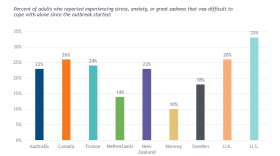Albany County will roll out a new program to deploy trained mental health workers to crisis situations.
Albany County Legislature Chair Andrew Joyce made it clear at the start of Wednesday’s press conference what a bolstering of the county’s response to mental health crises was and wasn’t.
“We are not going to defund the police in Albany County. We are not going to do that in the municipalities in Albany County. But we will reimagine policing. And we’re doing that today with the impetus of a new program,” said Joyce.
As part of the recently passed fiscal year 2021 budget, the county is including funding to expand its Mobile Crisis Team, with a start in the hilltowns south and east of the City of Albany.
The new initiative called ACCORD – the Albany County Crisis Officials Responding and Diverting program – will bring on two full-time salaried positions to allow a social worker to join with a trained EMT from the county sheriff’s office to respond to calls where law enforcement is not paramount.
The pilot program is based on a mental health initiative in Eugene, Oregon called CAHOOTS.
County Sheriff Craig Apple said that before the Mobile Crisis Team is deployed, the call for service must be determined non-violent by dispatchers.
“It may be something very simple. They must just have to transport that individual over to the Capital District [Psychiatric] Center, or ACMH, whatever it may be. Or we may have to take that person up to our homeless shelter,” said Apple.
Apple said the program would go a long way in preventing further escalation in calls involving individuals who may be experiencing a mental health episode.
“I think this is exactly what this area needs to help stem some of the violence that may happen by an officer really not knowing how to handle a mental health person, and that may not even be a crime, either,” said Apple.
Albany County Mental Health Director Dr. Stephen Giardano said the COVID-19 pandemic has created a greater need for mental health intervention.
“The goals for this program, it seems to me, is that we’re going to – in Albany County – begin to transform the crisis response system so that law enforcement isn’t always the first response,” said Giardano.
County Legislature Vice Chair Wanda Willingham, a Democrat like Joyce, brought up the case of a Dontay Ivy, an unarmed, mentally ill Black man who died after he was tasered by Albany city police in 2015.
“I feel too that Dontay Ivy and what happened with him, Albany County has responded to that. It may have taken a few years, but one thing that we do know is that we learned something from that,” said Willingham.
County officials want to see the ACCORD program expanded if the pilot proves successful.
Albany Mayor Kathy Sheehan said she expects a recommendation for such a program to be handed up from the Albany Policing Reform And Reinvention Collaborative, the city’s answer to Governor Andrew Cuomo’s mandate that communities develop a plan to reimagine policing by April 2021 at the risk of losing state funding.






